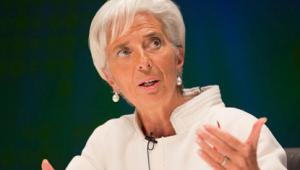Addressing an international conference in Jakarta, Indonesia, she said the IMF predicts global growth to accelerate further to 3.9% this year and next, but also warned that the economic landscape was shifting. She urged ASEAN countries to get themselves ready.
Countries in the region have built stronger economic foundations, but they must remember that economic transition is “underway” and it remains uncertain how this will affect companies, jobs and incomes, she said.
“Policymakers around the world…are preparing for the gradual normalisation of monetary policy in major advanced economies,” Lagarde added.
“Repairing the roof also means using fiscal reforms to generate higher public revenues, where needed, and improve spending. By boosting public finances, countries can increase infrastructure investment and development spending, especially on social safety nets for the most vulnerable.”
Additionally, the digital revolution is “beginning to change workplaces and economic structures” and countries should manage this transition carefully to create equal opportunities.
Lagarde said: “The goal must be to harness this digital revolution in the best possible way – by improving digital infrastructures and by making education systems fit for the future.
“I believe that very soon, we will be speaking of the change underway not as the ‘digital economy’, but just ‘the economy.’
“We need to ensure that this new economy is not just a boost to productivity and growth, but also a foundation for a world that works for young and old, rich and poor, urban communities and remote villages.”
She urged countries in the region to improve their long-term growth prospects and be more inclusive.
Many countries in Southeast Asia have already secured a relatively strong position and used policy changes to reduce inequality. Thailand introduced universal health coverage in 2011, while Indonesia improved the way it delivers assistance to low-income groups, Lagarde noted.






